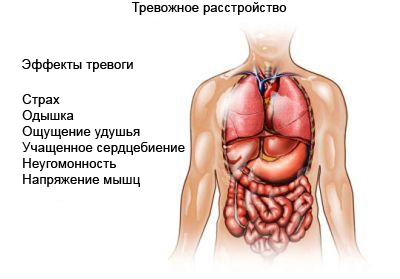Anxiety disorder
Description anxiety disorder
Anxiety is a normal state in the presence of fear, stress and anxiety. It is considered a normal reaction to stress or uncertain situations. Long-term or intense periods of anxiety may cause anxiety disorder. The disorder can also occur, if the alarm:
- There is no external threat (Causeless anxiety);
- Violate daily functions.
The most common types of anxiety disorders are:
- Phobias;
- Post traumatic stress disorder (PTSD);
- Picks;
- Obsessive compulsive disorder;
- Social Anxiety Disorder;
- Generalized Anxiety Disorder.
Anxiety is often complicated by alcohol abuse, drugs, and depression.
Causes Anxiety Disorder
Anxiety can be caused by many factors, including:
- The corresponding response in stressful circumstances;
- Receiving agents, that affect the nervous system, such as:
- Caffeine;
- Alcohol;
- Cocaine;
- Nicotine;
- Amfetaminы (eg, methamphetamine);
- Some herbal preparations;
- Biological factors:
- The imbalance of chemicals in the brain (eg, serotonin and noradrenaline);
- Traits;
- Incorrect perceptions and irrational beliefs (eg, Phobias);
- Unresolved emotional conflicts.
Risk factors
Factors, that increase the likelihood of anxiety disorder:
- Paul: female;
- The presence of family members with anxiety disorders;
- Stressful life events;
- Ineffective strategies;
- In the past, the presence of physical or psychological trauma.
Symptoms of anxiety disorder
Psychological symptoms may include:
- Anxiety and fear;
- Obsessive thoughts;
- A sense of impending danger or catastrophe;
- Fear or panic;
- Restlessness;
- Irritability;
- Impatience;
- Ambivalence;
- Problems with concentration.
Physical symptoms may include:
- Fast or irregular heartbeat;
- Sweating, especially Palms;
- Dry mouth;
- Redness;
- Muscle tension;
- Breathlessness;
- Dizziness and fainting;
- Difficulty sleeping;
- Feeling of choking;
- Frequent urination;
- Nausea and vomiting;
- Diarrhea;
- Constipation;
- Sexual problems;
- Tingling;
- Nail-biting or other similar behavior.

Diagnosis of anxiety disorder
The doctor asks about the symptoms and medical history, conducting psychological tests. It can be made a physical examination and laboratory tests carried out. Generally, the results of these tests are normal. The patient may be referred to a psychotherapist for further evaluation.
Treatment of anxiety disorders
Effective treatment typically includes a combination of various methods, including:
Lifestyle changes
- Complete rest and sleep;
- Smoking cessation;
- Reducing consumption or refusal of caffeinated beverages;
- Drinking alcohol in moderation;
- Abstinence;
- Reducing the impact of stress;
- Regular exercise.
Relaxation techniques
- Deep breathing;
- Meditation;
- Muscle relaxation;
- Massage;
- Participation in activities, rewarding;
- Yoga classes.
Social support
- Having the support of family and friends;
- Advice to improve coping skills disorders;
- Participation in support groups.
Psychotherapy
This therapy addresses thoughts, feel, and behavior, which play a role in the emergence of anxiety disorders. This helps to develop resistance to conflict.
Cognitive-behavioral therapy can help identify negative thought patterns and behaviors. Over time you can learn to reevaluate traditional views. It helps to choose the best options in response to stress and anxiety.
Cognitive-behavioral therapy is especially effective in children and adolescents.
Medication
In severe anxiety or anxiety disorder, medicines may include:
- Benzodiazepines;
- Buspirone;
- Antidepressants (eg, tricyclic antidepressants, selective serotonin reuptake inhibitor [SSRIs]).
Prevention of anxiety disorder
To prevent anxiety, you need to consider the ability to perform the following actions:
- Avoid situations, Professions, and human, that cause stress;
- We must stand, overcome situations, that cause concern;
- Find a relaxation technique, which operates, and use it on a regular basis;
- Develop and maintain a system of social support;
- It is necessary to express their emotions, not hiding;
- We need to get rid of irrational beliefs and counterproductive thoughts;
- You must refuse to accept the nicotine or other drugs, drinking alcohol in moderation.
